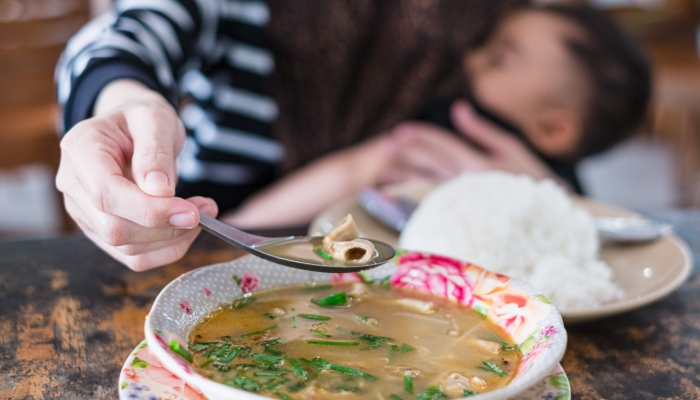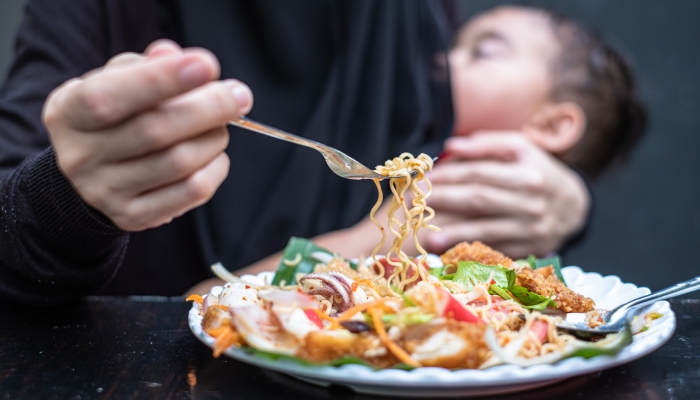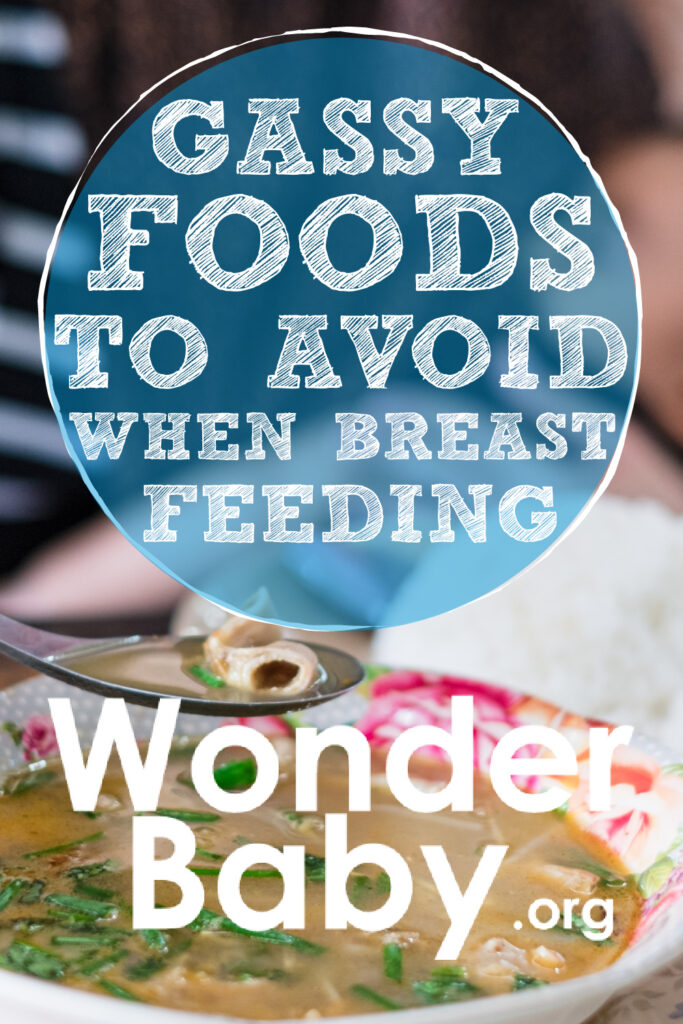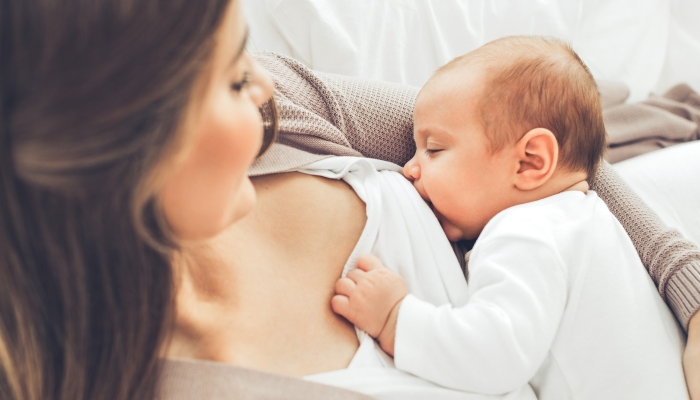Gassy Foods to Avoid When Breastfeeding

- Eating certain foods while breastfeeding can make your baby gassy.
- The most common dietary causes of gassiness in breastfed babies are beans, broccoli, and Brussels sprouts.
- Dairy is commonly blamed for gassiness in babies, but this is actually rare.
- Babies may also become gassy if they’re swallowing too much air while drinking.
As a new mother, you have so many things to worry about. Sleep schedules, safe laundry detergents, choking hazards, and spreading germs are just a few of the items on your list. If you have a gassy or colicky baby, helping them get some relief will probably move to the top of that list.
It’s hard to watch your new baby struggle with gas or discomfort. Luckily, there might be something you can change about your diet that will help them feel better. You can help your breastfed baby avoid belly pain and fussiness if you know which gassy foods to avoid when breastfeeding.
Can a Breastfeeding Mom’s Diet Cause a Baby to Be Gassy?
Certain foods in a breastfeeding mother’s diet may cause gas in breastfed babies. Your new baby’s digestive system might not be quite ready for some of the foods that pass from your breast milk into their new little bellies.
Dawn Earnesty and Alicia Grigg of Michigan State University Extension explain in the article A Breastfeeding Mother’s Diet For An Infant With Colic that what a mother eats passes into their breast milk, and that can cause fussiness and even colic in some babies.
Even with this potential downside, the benefits of breastfeeding still outweigh any risk of breast milk causing gas and colic. Breastfeeding mothers should try to eat a balanced diet and drink plenty of water.
Diet and Your Milk Supply
Although nutrients in your diet pass into your breast milk, they do not change the composition of your breast milk. Breastfed infants all receive similar amounts of carbohydrates, fats, and proteins no matter what their mother eats. A diet lacking in nutrition will affect the breastfeeding mom more than their baby.
You can speak to a registered dietician about how to choose the right food to support yourself and your growing baby. To feel your best while breastfeeding, try to include healthy fats, leafy greens, and enough protein to give yourself vitamins, minerals, and calories to support yourself.

Should You Avoid Certain Foods to Prevent Baby Gas?
Most of what you eat will cross over from your digestive tract into your blood and your breast milk. Nursing moms can help prevent baby gas by avoiding gas inducing foods. Try to pay special attention to what you eat and when your baby seems to be passing gas more often. Sometimes, one particular food can be the cause of gas in your breastfed baby.
10 Gassy Foods to Avoid When Breastfeeding
While not all of these will cause gas in every baby, your baby might be extra sensitive to some of these foods. If you notice your baby’s gassiness seems worse than normal, you might want to try to eliminate some of these common culprits:
1. Spicy Foods
While not all babies react poorly to spicy foods, some babies are more sensitive and may have gas or diarrhea when exposed to spicy food.
2. Broccoli
Just like with adults, broccoli can cause gas for breastfed babies. This is due to a sugar in broccoli that is not digested until the bacteria in your gut ferment it. For many newborns with immature stomachs, this is a lot to handle.
3. Beans
Beans are a great addition to most diets because they contain a lot of fiber. Unfortunately, this can also cause gas and bloating.
4. Brussels Sprouts
Similar to broccoli, Brussels sprouts can be difficult to digest. In fact, Gerald Freidman of the Gastroenterology Clinics of North America writes in an article that Brussels sprouts should be avoided by those with digestive issues or irritable bowel syndrome.
5. Cabbage
The fiber and sugars in cabbage can make both parents and infants gassy. Cooked cabbage is less likely to cause abdominal pain and gas.
6. Dairy Products
Often the first to take the blame for digestive issues, lactose intolerance is less common than most parents believe. La Leche League explains that if your baby has a sensitivity to cow’s milk, they will have severe and even bloody diarrhea when they are exposed to dairy.
7. Soy
Soy is a great source of protein, but is a common cause of gas in many newborns.
8. Whole Wheat
Whole grains are a great source of nutrition for many nursing moms. However, as a high-fiber food, they can make babies gassy.
Some people worry about celiac disease in their breastfed babies. However, a study by L. Å. Persson, A. Ivarsson & O. Hernell, titled Breast-Feeding Protects Against Celiac Disease in Childhood — Epidemiological Evidence, shows that breastfeeding is actually protective against celiac disease, which is a condition developed later in life.
9. Caffeine
Energy drinks should be avoided while pregnant and breastfeeding. The high amounts of caffeine in them can pass through your breastmilk to your baby and can cause fussiness, gas, and colic. Coffee in excess can do the same thing, but if you can’t get by without a little boost, try to limit yourself to 200mg per day.
How Long Do Gassy Foods Stay in Breast Milk?
After moms eat foods, each particular food should be cleared from the breast milk within 6-8 hours. You cannot speed up this process by expressing more milk or pumping right after you eat certain foods. No matter how much you pump, the nutrients will remain in your milk for the same amount of time.
If you eat broccoli or other foods that you know will bother your baby, consider using milk expressed in the 6 hours afterwards for a breastmilk bath or to make a moisturizer.

How to Help Relieve Your Baby’s Gas
If you have a gassy baby, there are several things you can do besides eliminating foods to help them be more comfortable.
Burping
Remember to burp your baby after every feeding. Hold them in a comfortable position near your shoulder and gently pat them on the back to help move any air they may have swallowed up and out.
Baby Massage
You can massage your baby’s belly or help them with leg exercises to get gas moving through their digestive system and out. One easy technique is to lay your baby on their back and gently move their legs in a bicycle motion.
Good Latch or a Special Bottle
Baby’s fussiness may be caused by them swallowing extra air while they drink, whether they have a poor latch or need to drink from a special bottle. Your lactation consultant can help you with good breastfeeding or even bottle feeding techniques. A good latch or special bottle can help your baby avoid swallowing air.
FAQs
Can you drink alcohol or caffeine while breastfeeding?
Up to 200mg per day of caffeine is generally safe for breastfeeding mothers. Babies should not consume any breast milk immediately after their mother drinks. La Leche League recommends drinking alcohol sparingly while breastfeeding, and waiting at least two hours to pump or breastfeed after one alcoholic beverage.
How much water should you drink while breastfeeding?
There is no set rule for how much water you should drink while breastfeeding. However, once you start to feel thirsty, you’re probably already behind. Drinking about 1 oz per kilogram of your own body weight is usually plenty, plus an extra 8 oz for each 30 minutes of physical activity you participate in during the day.
Are food allergies genetic?
There is a genetic component to some food allergies. If you have a food allergy or intolerance, your baby may inherit your same food sensitivities. The most common food allergies in infants and young children include eggs, milk, peanuts, wheat, soy, and tree nuts.
Do carbonated beverages make babies gassy?
Although carbonated beverages might make a breastfeeding mother gassy, the carbonation is not passed to the baby through the breastmilk. The only things to worry about when you consume carbonation is the sugar, artificial sweeteners, and caffeine that might be present in those drinks.

The information WonderBaby provides is not intended to be, and does not constitute, medical or other health advice or diagnosis and should not be used as such. Always consult with a qualified medical professional about your specific circumstances.
Related Posts

Breastfeeding, Sleep
Sleep and Breastfeeding: A Comprehensive Guide for Nursing Moms
Many people assume breastfeeding and sleep training don’t go together, but it is possible to help your baby sleep better while continuing your breastfeeding journey.

Breastfeeding
Comfort Nursing: Pros, Cons, and How to Stop
Find out what comfort nursing is, when should you worry about it, and how to stop or limit your baby's comfort nursing (especially at night!).

Breastfeeding, Product Reviews
5 Best Breastfeeding Chairs for Nursing Moms of 2023
Whether you want a gentle rock, a smooth glide, or a cozy cuddle to soothe your baby to sleep, you’ll have your pick of the best breastfeeding chairs on the...